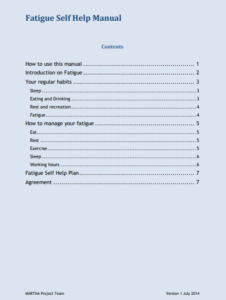Alandia Marine insurance firm hosted an interview with Dr Claire Pekcan, Director at Safe Marine to shed attention once again on fatigue, which is a great concern for seafarers and the whole maritime community. There are things that seafarers can do for themselves to counteract fatigue, Dr Pekcan highlights and a Fatigue Self Help can help towards.
In the maritime industry, fatigue is a real danger because mariners often work long days with irregular sleep patterns, or simply do not get enough sleep. Fatigue has a large impact in the Maritime industry because it can lead to accidents.
For example, if a fatigued officer falls asleep on watch and this leads to a collision or grounding of the ship.
The shipping industry, and shipping companies can try to prevent fatigue through watch and rest schedules designed to give mariners the best opportunities to get enough rest and sleep.
However, the Fatigue Self Help Guide in the end deals with fatigue management that can be done by the mariners.
Fatigue is a difficult phenomenon to define and has a variety of components. In fact, it is associated with lots of different health complications. Long term effects of fatigue are for example; diabetes, heart conditions and strokes.
…Dr Claire Pekcan, Director at Safe Marine noted.
During the interview there were highlighted the above points which may mitigate fatigue onboard:
- A good start to change the safety culture in a company is to raise awareness for what is working and what is not working and base it on real factual evidence.
- From the airline industry comes a great innovation to counteract fatigue: Fatigue risk management. By monitoring sleep deprivation levels with a software programme using algorithms which predicts how tired people will be if they work in a particular pattern for any length of time. The system is an important tool where people can report if they are not fit for duty.
- Many terminals operate 24/7 and the ship crew might not feel that they are empowered to speak up to stop operations if they are too tired. Even if captains are taking those brave actions to ask for more time in port because the crew is not well-rested, they are not always supported, for example from their own company or the terminals.
- There are things that seafarers can do for themselves to counteract fatigue. One source of knowledge is the Fatigue Self Help Manual that is linked below.
One of the things that seafarers can do for themselves in order to face fatigue, is to regulate their emotions. For example, not pretending you are happy, when you are not and hiding how you feel.
….Dr Claire Pekcan added.
MARTHA Project Team has compiled a useful guidance manual which is intended to help seafarers find strategies that they can use to help them avoid fatigue while onbaord. By the end of this manual, seafarers will be able to write their own Fatigue Self Help Plan. Namely, they can use this plan to try to reduce the amount of fatigue they feel during next voyage.
The UK’s Maritime and Coastguard Agency says, ‘Fatigue Management Plans are proven to work. Evidence from a range of industries underpins this statement. Organisations which manage fatigue effectively are shown to experience significantly reduced levels of accidents, injuries and staff turnover.’
Explore more helebelow


































































